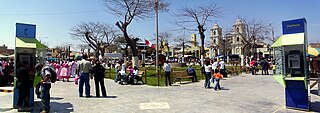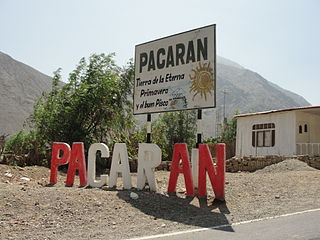Nuevo Imperial | |
|---|---|
| Country | |
| Region | Lima |
| Province | Cañete |
| Founded | June 22, 1962 |
| Capital | Nuevo Imperial |
| Government | |
| • Mayor | Alex Salas (2019-2022) |
| Area | |
| • Total | 329.3 km2 (127.1 sq mi) |
| Elevation | 132 m (433 ft) |
| Population (2017) | |
| • Total | 26,233 |
| • Density | 80/km2 (210/sq mi) |
| Time zone | UTC-5 (PET) |
| UBIGEO | 150510 |
Nuevo Imperial District is one of sixteen districts of the province Cañete in Peru. [1]

The districts of Peru are the third-level country subdivisions of Peru. They are subdivisions of the provinces, which in turn are subdivisions of the larger regions or departments. There are 1,838 districts in total.

Cañete is a province located in southern Lima Region, Peru. It is bordered by the Lima Province on the north, the Ica Region on the south, the Huarochirí and Yauyos provinces on the east, and the Pacific Ocean on the west. Its capital is the town of San Vicente de Cañete District. San Luis is the Capital of the Afro-Peruvian Folklore.

Peru, officially the Republic of Peru, is a country in western South America. It is bordered in the north by Ecuador and Colombia, in the east by Brazil, in the southeast by Bolivia, in the south by Chile, and in the west by the Pacific Ocean. Peru is a megadiverse country with habitats ranging from the arid plains of the Pacific coastal region in the west to the peaks of the Andes mountains vertically extending from the north to the southeast of the country to the tropical Amazon Basin rainforest in the east with the Amazon river.
Its boundaries are:
- North: District Quilmaná.
- South: District Lunahuaná.
- East: District Lunahuaná.
- West: Imperial district and district of San Vicente de Cañete.








